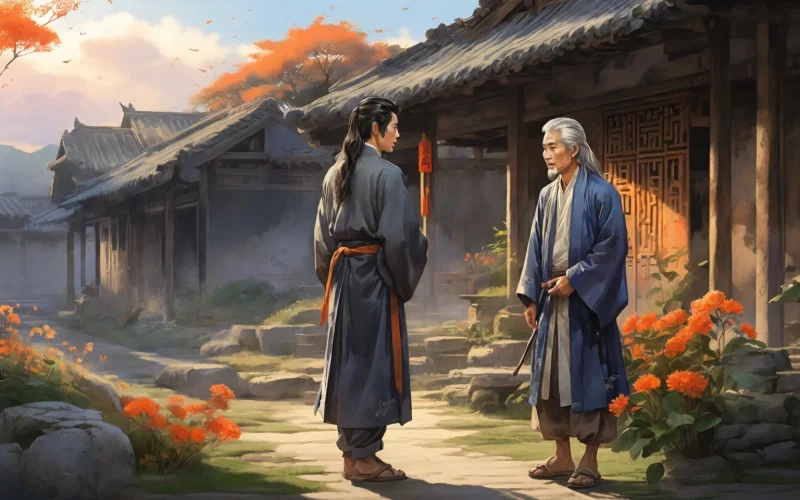Driven by hunger, I go out
But I do not know whereabout.
I plod on and on till this land;
I knock and speechless there I stand.
The host, seeing my hidden pain,
Gives me food lest I'd come in vain.
We talk until the sun's decline;
We empty cup on cup of wine.
I'm glad to make acquaintance new;
I write this verse as it is due.
I can't repay like Han Xin fed
By a washerwoman her bread.
How to express my hearty thanks?
In underworld on griefless banks.
Original Poem
「乞食」
陶渊明
饥来驱我去,不知竟何之。
行行至斯里,叩门拙言辞。
主人解余意,遗赠岂虚来。
谈谐终日夕,觞至辄倾杯。
情欣新知欢,言咏遂赋诗。
感子漂母惠,愧我非韩才。
衔戢知何谢,冥报以相贻。
Interpretation
This poem was composed in 426 CE when Tao Yuanming was 62 years old (though some scholars suggest it was written at age 21). It depicts the poet, driven by hunger to beg for food, encountering a kind host who offers him hospitality. Through this seemingly humbling experience, the poem expresses profound gratitude for human kindness and embodies the noble virtue of "feeling obligated to repay kindness." Though centered on the act of begging, the poem transcends material poverty to reveal the poet's spiritual clarity and moral brilliance through its sincere and natural expression.
First Couplet: "饥来驱我去,不知竟何之!"
Jī lái qū wǒ qù, bù zhī jìng hé zhī!
"Hunger drives me out, not knowing where to go!"
The opening directly states the reason for begging—honest and unadorned, reflecting the poet's simple, unpretentious character while hinting at the hardships of his later years.
Second Couplet: "行行至斯里,叩门拙言辞。"
Xíng xíng zhì sī lǐ, kòu mén zhuō yán cí.
"Walking on until this village, knocking at the door with stumbling words."
This couplet vividly captures the poet's awkwardness while begging. The phrase "stumbling words" reveals both humility and inner conflict, making the scene deeply moving.
Third Couplet: "主人解余意,遗赠岂虚来。"
Zhǔ rén jiě yú yì, yí zèng qǐ xū lái.
"The host understood my need; his gift made this trip worthwhile."
The stranger's kindness brings the poet relief, highlighting the traditional virtue of mutual aid and goodwill among ordinary people.
Fourth Couplet: "谈话终日夕,觞至辄倾杯。"
Tán huà zhōng rì xī, shāng zhì zhé qīng bēi.
"We talked from day to night; when wine came, we drank freely."
Though begging was an act of necessity, human connection transformed it into a warm exchange. The poet's joy in this kindness reflects his magnanimous spirit.
Fifth Couplet: "情欣新知欢,言咏遂赋诗。"
Qíng xīn xīn zhī huān, yán yǒng suì fù shī.
"Delighted by this new friendship, I expressed my joy in verse."
"Composing poetry" becomes both an emotional outlet and a gesture of gratitude, showcasing the poet's cultural refinement and sincerity.
Sixth Couplet: "感子漂母惠,愧我非韩才。"
Gǎn zǐ piào mǔ huì, kuì wǒ fēi Hán cái.
"I'm touched by your kindness like the Washerwoman's, ashamed I lack Han Xin's talent to repay."
Alluding to the historical figures "Washerwoman" and "Han Xin," the poet expresses deep gratitude while modestly lamenting his inability to reciprocate materially.
Seventh Couplet: "衔戢知何谢,冥报以相贻。"
Xián jí zhī hé xiè, míng bào yǐ xiāng yí.
"How to thank you? I can only hope to repay you in the unseen realm."
These closing lines overflow with heartfelt emotion. Though unable to repay the kindness now, the poet vows spiritual gratitude, embodying the traditional moral ideal of "reciprocating kindness."
Holistic Appreciation
Though titled "Begging for Food," this poem transcends material poverty to reveal Tao Yuanming's candid and pure heart. The poet confronts the awkward reality of begging but records human kindness with such sincerity that a simple act of seeking food becomes a moving spiritual encounter. The poem's plain, unembellished language carries an undeniable emotional power, reminding us that warmth still exists in the world. Through its depiction of wandering, receiving aid, and expressing gratitude, the poem also reflects Tao's noble character—his refusal to flatter the powerful and his unwavering moral integrity.
Artistic Merits
The poem's language is straightforward and intimate, narrated in the first person with a smooth progression from begging to receiving hospitality, drinking together, composing poetry, and finally expressing gratitude. Tao transforms an ordinary moment into a poetic instant rich with human feeling, conveying genuine emotion through delicate description. Historical allusions (e.g., "Washerwoman," "Han Xin") deepen the poem's meaning and emotional resonance.
Insights
"Begging for Food" is not just a poem about poverty but a celebration of human kindness. Tao Yuanming's sincere expression embodies the traditional virtue of "feeling obligated to repay kindness," while his attitude teaches us that even in hardship, one can maintain a pure and grateful heart. The poet's candidness and authenticity set an example of dignity, humility, and moral warmth—a timeless model of noble character.
Poem translator
Xu Yuanchong (许渊冲)
About the poet

Tao Yuanming(陶渊明), 365 – 427 CE, was a poet, literary figure, fu writer, and essayist active during the late Eastern Jin and early Liu Song dynasties. Born in Chaisang (near present-day Jiujiang, Jiangxi Province), he pioneered a new genre of pastoral-themed literature, expressing profound philosophical insights through simple language. His poetic style became an enduring aesthetic standard in classical Chinese poetry.











